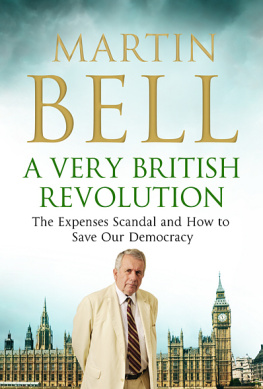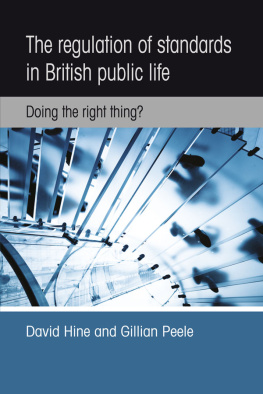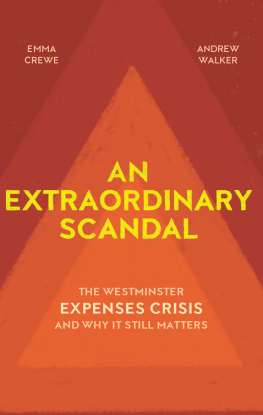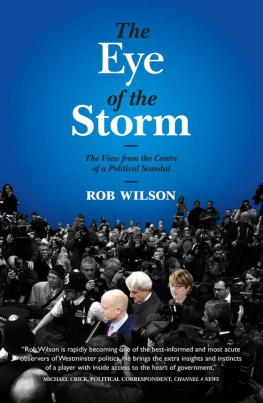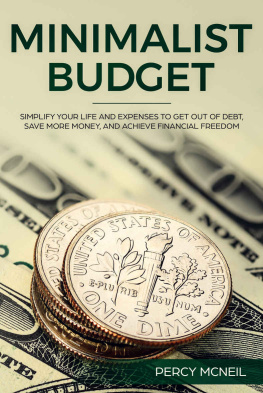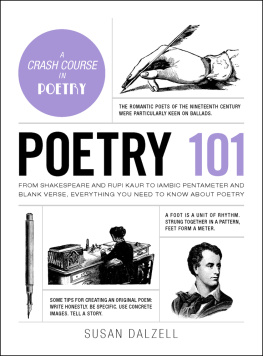A VERY BRITISH REVOLUTION
The Expenses Scandal and How to Save Our Democracy
MARTIN BELL

ICON BOOKS
Published in the UK in 2009 by
Icon Books Ltd, Omnibus Business Centre,
3941 North Road, London N7 9DP
email:
www.iconbooks.co.uk
This electronic edition published in 2009 by Icon Books
ISBN: 978-1-84831-100-8 (ePub format)
ISBN: 978-1-84831-102-2 (Adobe ebook format)
Printed edition (ISBN: 978-1-84831-096-4)
Sold in the UK, Europe, South Africa and Asia
by Faber & Faber Ltd, Bloomsbury House,
7477 Great Russell Street, London WC1B 3DA
or their agents
Distributed in the UK, Europe, South Africa and Asia
by TBS Ltd, TBS Distribution Centre, Colchester Road,
Frating Green, Colchester CO7 7DW
Published in Australia in 2009
by Allen & Unwin Pty Ltd,
PO Box 8500, 83 Alexander Street,
Crows Nest, NSW 2065
Distributed in Canada by
Penguin Books Canada,
90 Eglinton Avenue East, Suite 700,
Toronto, Ontario M4P 2YE
Text copyright 2009 Martin Bell
The author has asserted his moral rights.
No part of this book may be reproduced in any form, or by any
means, without prior permission in writing from the publisher.
Typeset by Marie Doherty
Contents
Martin Bell OBE is one of the best-known and most highly regarded names in British television journalism. As a BBC reporter he has covered foreign assignments in more than 80 countries and eleven wars including Vietnam, Nigeria, Angola, Nicaragua, The Gulf and Bosnia, where millions watched as he was nearly killed by shrapnel. In 1997 Martin became the first Independent MP to be elected to Parliament since 1950, and he has since campaigned tirelessly for trust and transparency in British politics.
His previous books are In Harms Way (Penguin, 1995), An Accidental MP (Viking, 2000), Through Gates of Fire (Weidenfeld & Nicolson, 2003), and The Truth That Sticks (Icon, 2008).
Swindlers List
I wish I had my own duck house,
Redacted and anonymous,
A shaded pool where ducks could float,
A pond, a river or a moat,
A place unto the manor born
Where moles would not uproot the lawn.
I was not born to privilege,
But loitered at the waters edge,
And played the Honourable Member
From January to December.
I wish to thank the voters sense
For choosing me at their expense;
On their behalf I did my best,
Including things they never guessed.
Though my accomplishments were zero,
In fiddling I was next to Nero,
I was a self-philanthropist,
Master of the John Lewis List;
I had a profitable innings
And duly pocketed the winnings,
The subsidies, the perks, the pay,
The petty cash, the ACA.
The Tudor beams, the chandeliers,
The bills for swimming pool repairs,
The hanging plants, the trouser press,
Nothing exceeded like excess,
The whirlpool bath, the horse manure,
Whiter than white, purer than pure.
And so it was until, alas,
The MPs scandals came to pass.
I was your Honourable Friend
A pity that it had to end.
And then to avoid the sneers of Mr Paxman
I wrote a cheque and sent it to the taxman.
Introduction
We have been through a period of political revolution the like of which we have not known in our lifetimes. It has been very British and very peaceful, but nonetheless profound. Its outcomes will permanently change the nature of our politics and especially that of the House of Commons. It has arisen from the publication of the detailed expenses of Members of Parliament, which were in most cases beyond reason and in some beyond belief. They ranged from petty thieving to outright fraud. They provoked what can perhaps be best described as a 21st-century version of the Peasants Revolt an uprising of the people against the political class and its practices and patterns of corruption. Not all MPs were equally guilty. Some were not guilty at all. But the corruption was revealed to be widespread and pervasive. We have been witnesses of something unique in its character and which will, I believe, be positive in its consequences.
It was hard to know whether to laugh or cry: we did a bit of both. Corruption, said Peter Ustinov, is natures way of restoring faith in democracy. Great reforms are driven by great scandals. And this has been one hell of a scandal. Not only have we lost faith in our politicians: they have even lost faith in themselves. So the perpetuation of the status quo is not an option for any of us. These events will be studied for years by those who will write the history of our insurrection. This book, which was written as it unfolded, is an attempted first draft of that history.
So rich is the seam of source material that when I told a friend about it, he asked: How many volumes? Just one will do for the time being. Others may follow. The list of misdemeanours goes on and on. Not all the politicians caught up in the scandal have yet been driven from office. But it has changed the weather in Westminster, the style of political campaigning and the terms of trade between the parties. So it is a very British revolution. It has really started something.
Alan Duncan (Conservative, Rutland and Melton) was one of the MPs who found himself in the thick of it. Not only was he Shadow Leader of the House, and therefore responsible for his partys policy on MPs expenses, but his own gardening costs were found to be on the high side, including 598 to overhaul a ride-on lawnmower. A protester had himself filmed digging a pound-shaped flower bed in Mr Duncans lawn in Rutland and planting it with flowers. The video became an instant hit on YouTube. The MP wisely asked the police not to prosecute, and he said: The outpouring of fury we are witnessing is like a spring revolution. But he also thought that at 64,000 a year MPs were underpaid and forced to live on rations. The MP for Rutland and Melton was removed from the Shadow cabinet.
There are those who believe that the outpouring of fury will pass like a sudden storm, and that when it has passed they can carry on much as they used to. There are others who understand that it has changed our politics permanently. I am firmly in the second camp. We cannot return to where we were, which was the politics of the pig trough, because the people will not stand for it. The revolution will not be complete until all the rogues in the House are gone and public confidence in the MPs remaining is restored. The overhang of the scandal is so great that even new Members in a new Parliament will find themselves initially on probation. The restoration of public trust in public life will be work in progress, perhaps for many years. They will have to keep at it. And so shall we.
My only qualification for writing this account of the ongoing revolution is that I am a taxpayer and a true-believing democrat who was once an MP and a part of the Commons system of self-regulation, the Committee on Standards and Privileges. I was there. I sat back and marvelled. I saw what worked and what didnt especially what didnt. For all its neo-Gothic grandeur, the House had something of the Wild West about it: too many villains, too few sheriffs, and laws that turned out not to apply to the regulars in the saloon bar. Even ten years ago, from the vantage point of Committee Room 13, the regular meeting place of the Select Committee on Standards and Privileges, I believed that the regulatory system, such as it was, would one day hit the buffers. I had no idea that the crash would be so sudden and spectacular. Some resigned and others were left clinging to the wreckage.

